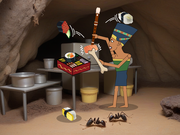都什么年代了
Characters and words in 都什么年代了
youngest / most junior / tiny / one (unambiguous spoken form when spelling out numbers, esp. on telephone or in military) / one or ace on dice or dominoes / variant of 吆[yao1], to shout
to substitute / to act on behalf of others / to replace / generation / dynasty / age / period / (historical) era / (geological) eon
代
=
亻
+
弋
:
Rosa Luxemburg (亻) wants to practice her archery skills in the airplane's bathroom (ai4). On the other side Don Quixote (d) is standing, but they don't have an apple, so they substitute the apple with a token (代, 代币). Don Quixote is trembling heavily as Rosa lifts her bow (弋) and prepares to shoot down the token from Don's head.
(completed action marker) / (modal particle indicating change of state, situation now) / (modal particle intensifying preceding clause)
to finish / to achieve / variant of 瞭|了[liao3] / to understand clearly
了
=
乛
+
亅
:
Mnemonic symbol from "to finish" and the shape of the character: a prize cup.
Li Qingzhao (li) is responsible for manufacturing a prize cup (了). She only needs to add a poetic engraving. Unfortunately, she suffers from a writer's block. In the aorta's living room (ao3), someone left a cryptic message engraved on the walls using a sickle (乛), which is still lying on the floor. Being an accomplished poet Li Qingzhao is able to understand the message clearly (了), realizes its poetic potential and starts to engrave it on the prize cup using a crowbar (亅).
Li Qingzhao (li) is responsible for manufacturing a prize cup (了). She only needs to add a poetic engraving. Unfortunately, she suffers from a writer's block. In the aorta's living room (ao3), someone left a cryptic message engraved on the walls using a sickle (乛), which is still lying on the floor. Being an accomplished poet Li Qingzhao is able to understand the message clearly (了), realizes its poetic potential and starts to engrave it on the prize cup using a crowbar (亅).
Words with 都什么年代了
都什么年代了
is not used as a component in another word.
Sentences with 都什么年代了
都什么年代了 currently does not appear in any sentence.



